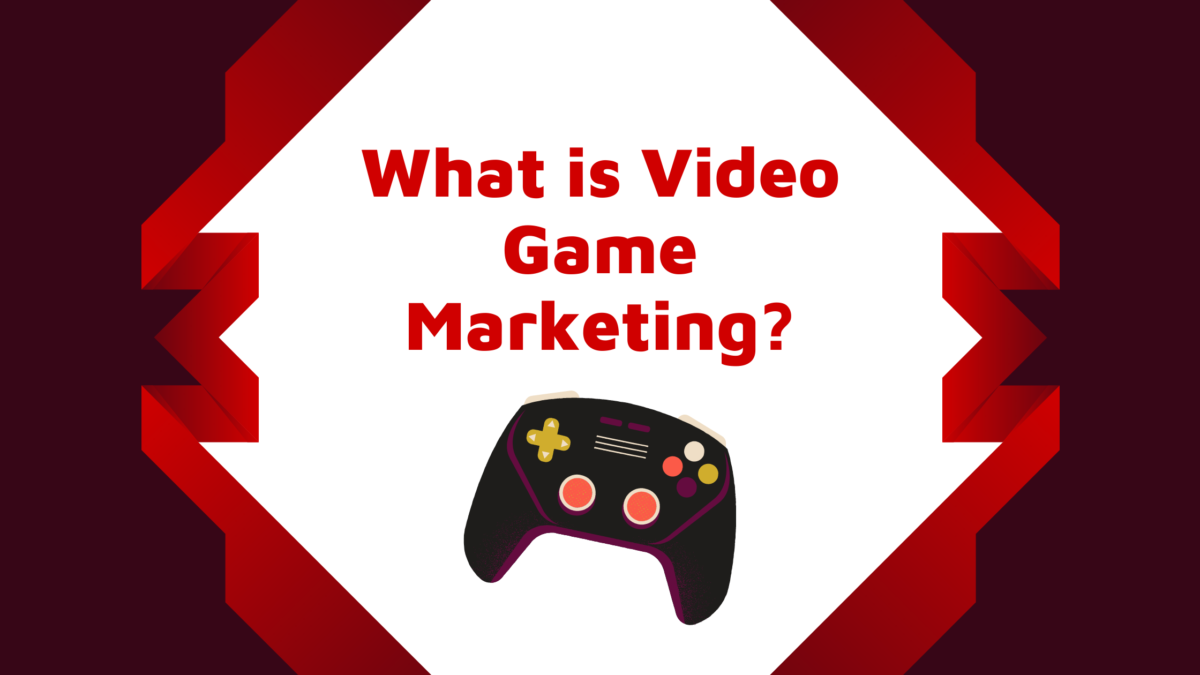In 2021, a total of 11,893 games launched on Steam, averaging just under 1000 games per month. Since the inception of Steam Greenlight in 2012 (later replaced by Steam Direct in 2017), independent video game developers have been granted more freedom than ever before to put their creations onto the platform. The rise of releases is rapidly climbing year-after-year and as a result, so too does the importance of video game marketing.
With the addition of other PC game storefronts (Epic Games Store, GOG.com, itch.io, etc.) and console manufacturers’ own digital shops (PlayStation Store, Microsoft Store & the Nintendo eShop), in addition to subscription services like Xbox Game Pass, getting eyes on your video game is tougher than it has ever been before.
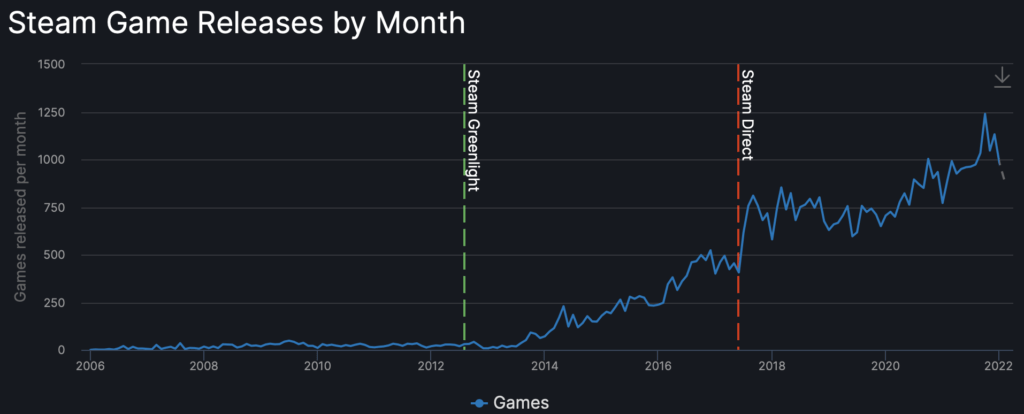
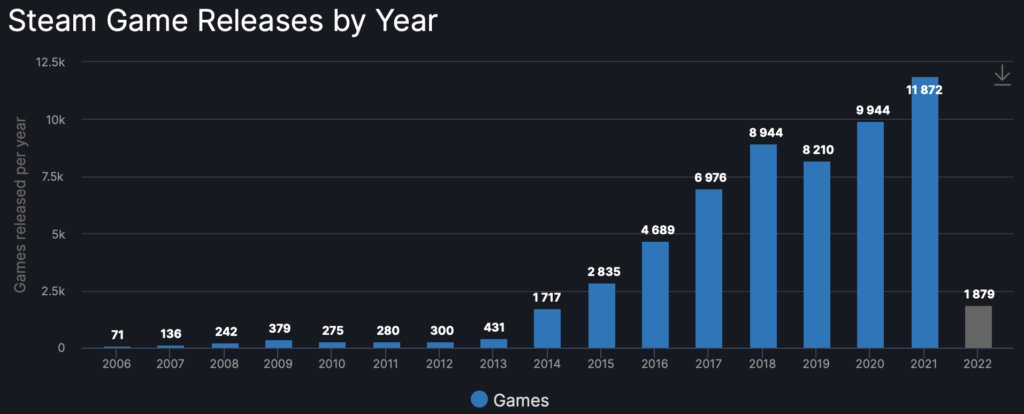
What is Video Game Marketing?
The history of video game marketing has been a wild ride and with the seemingly out-of-control rise of indie games, marketing them has become the newest challenge.
If your game gets picked up by a publisher, chances are they’ll do a lot of the marketing for you. However if you’re doing the marketing yourself, then there are various strategies you can look into:
Social Media
Social media is the most obvious avenue and the one that many indie developers will think of first.
The indie game development scene is widely considered to be most prominent on Twitter. While it’s ideal to have a presence on every platform (Facebook, Instagram, YouTube, TikTok, etc.), independent game developers tend to gain large followings with the blue bird.
In the marketing world today, video content is king. Creating short videos, GIFs and trailers that effectively demonstrate what makes your game special is the quickest way to grab players’ attention.
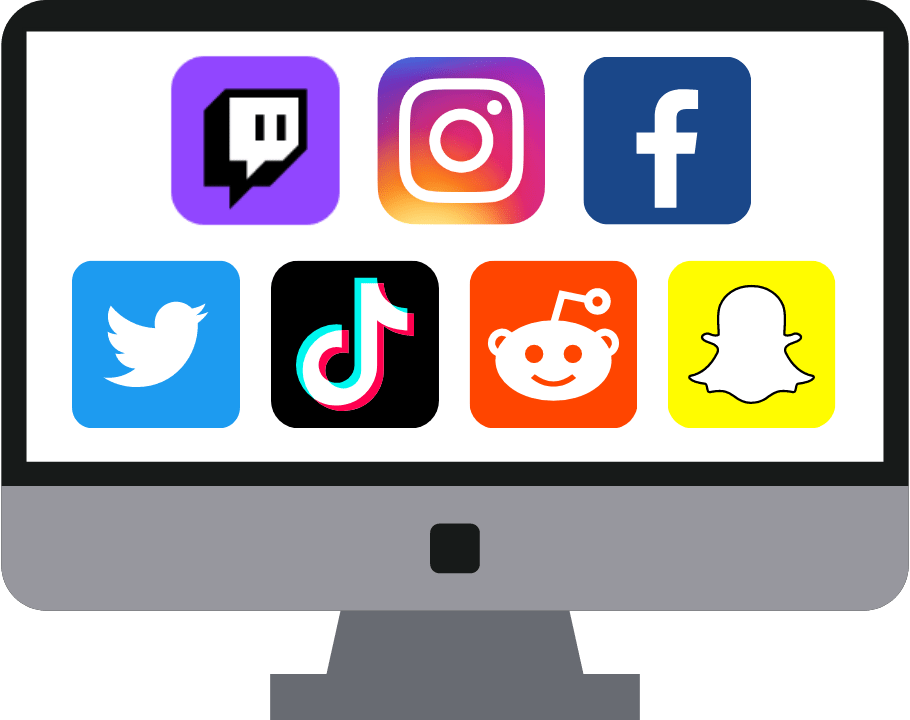
Effectively using hashtags like #IndieGaming and #IndieGameDev, as well as #WishlistWednesday and #ScreenshotSaturday and creating a sustainable rhythm with them will help with your Twitter marketing’s consistency, keeping followers engaged.
Be sure to interact with fans, media outlets, influencers and fellow developers. As a fellow introvert, I know how much of a mountain this may be to climb, but you may be surprised by just how supportive people can be.
Discord
The coolest thing about following a game’s development is being able to interact with its creators. By creating a following on social media, directing them to your Discord will allow you to build a much deeper relationship with your fans that’ll continue into your future projects.
Discord not only becomes another outlet to share news and updates from your game but it also helps to break down much of the formality that comes from comment sections. On Discord, you’ll be able to interact with your followers in a more casual, conversational tone and in turn, they will likely be more willing to offer constructive feedback.
Reddit shouldn’t be considered as a viable long-term strategy, but rather as a way in which to quickly boost your follower count (especially when starting from scratch). As long as you’re following your chosen subreddit’s rules, you can find many like-minded fans, gamers and developers on Reddit as it allows you to target specific niches.
For a broad subreddit to post in, you can go with r/IndieGaming, but you may find some stiff competition there. If, for example, you’re developing a visual novel, the subreddit r/VisualNovels has over 500K members and if you post in here, you’re guaranteed to be targeting your niche.
Although, no matter where you post, make sure you’re posting something visually eye-catching, like a screenshot or a GIF. If you simply post text or an image that lacks that special hook, it will likely get buried beneath other posts.
Demos
Creating a short demo of your game will allow players to go hands-on with whatever it is you’ve been posting about for months on end. If you’ve successfully built a following with the tips above, you’ll likely have piqued the interests of various gamers who would love to go hands-on with it.
Putting out a demo partway through development is also a fantastic way to get valuable feedback on your project. It’s important to embrace this feedback as doing so will not only improve the overall quality of your game but it’ll also show that you are listening to your audience and are dedicated to creating the best game that you can. Itch.io is a great place to start putting your demo out there.
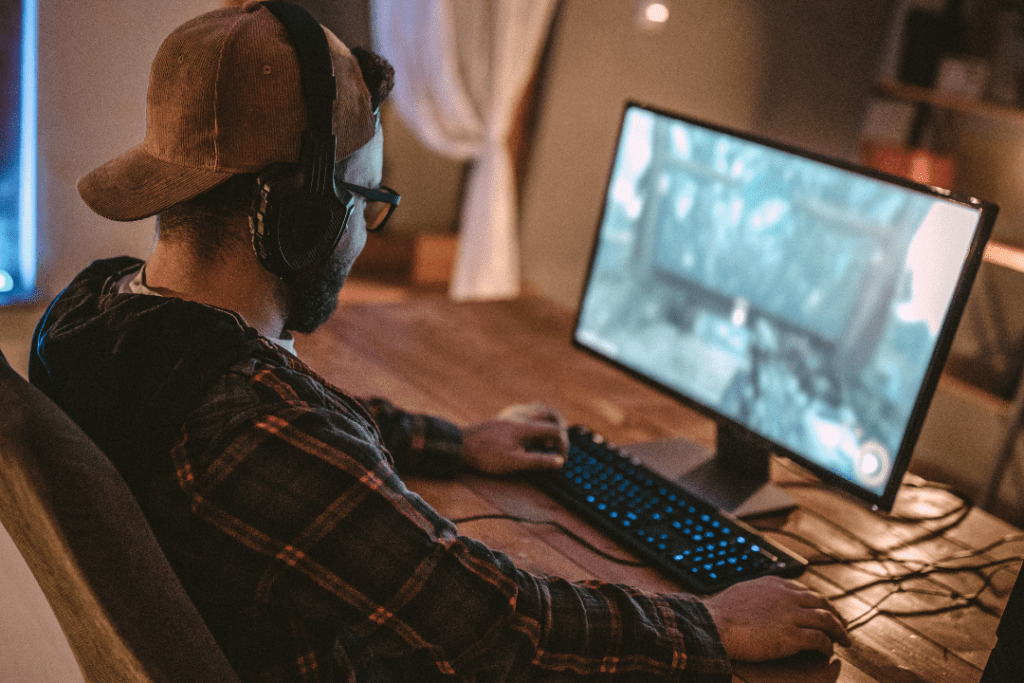
However, it’s important that you put out a high quality demo and not something you’ve slapped together at the last minute. A demo can help to better articulate to fans what makes your game special but if it’s riddled with bugs, glitches and is simply not up to par, then it’ll likely have the opposite effect and deter people away from your game before it’s even released.
Conventions/Live Events
The internet and the COVID-19 pandemic has surely diminished the importance of public conventions, but that doesn’t mean that there is no demand for them.
Live events (PAX, EGX, etc.) allow game developers to showcase their games in-person and for attendees to stop and try whatever catches their eye.
As someone who has attended many conventions, players will always hold a special fondness for the games they try out at these events as it fills them with warm and fuzzy memories.
The downside to these events is that they often cost money to rent a booth and floor space, a luxury that small independent teams may not have.
Reviewers, Streamers & Influencers
Building up your own following is great, but that doesn’t mean you should limit yourself there. Getting your game into the hands of online influencers, Twitch streamers and media outlets will allow you to leverage their followings.
Throughout your development process, you should be adding any and all emails to your contact list as possible. Direct social media followers to your newsletter, prompt website visitors to subscribe to said newsletter and, most of all, create a separate email list for press in order to send news updates, press kits and, eventually, review codes.
You may be tempted to throw codes around willy-nilly and see what sticks and while you’ll want as much coverage as possible, it also pays to be strategic. Do your homework and study their niches; if you’re developing an RPG, look for a website that specialises in this genre; if you’re developing a cute farming simulator, find Twitch streamers who have built a following playing these games. Niches exist are filled with passionate fans – they exist for a reason.
There are many ways that outlets can be contacted, whether it be directly via social media or through their email addresses. Websites will generally have contact pages that you can reach them through and, from personal experience, smaller outlets and streamers tend to enjoy when developers reach out to them unprompted.
When it comes to video game marketing, appeal to and embrace your niche because at the end of the day, they are your primary target audience.
